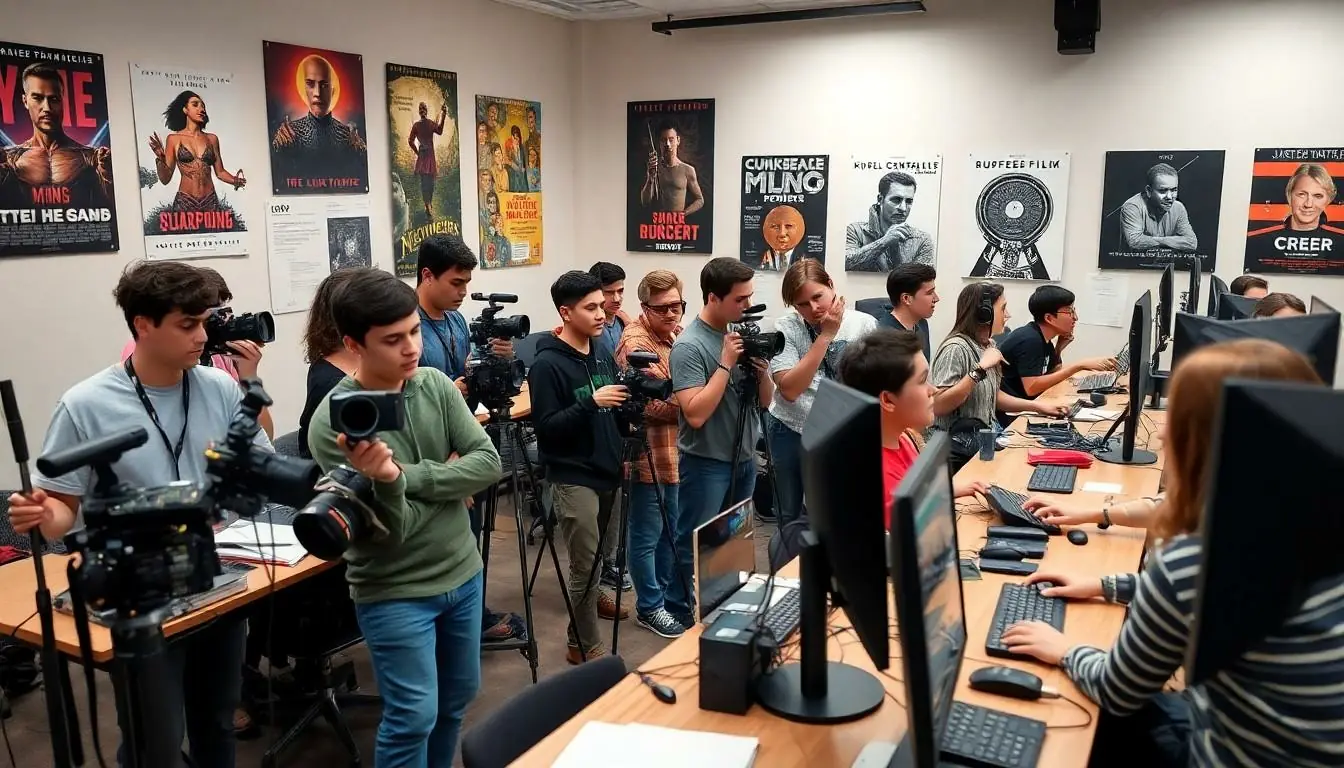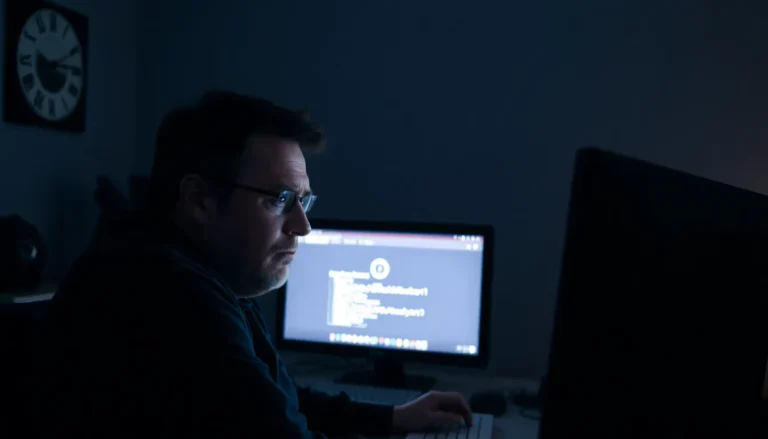Table of Contents
ToggleIn a world where everyone’s a content creator, standing out is more crucial than ever. Enter the audio and video production technology program—your secret weapon to mastering the art of storytelling through sound and visuals. Whether it’s crafting a viral video or producing the next chart-topping podcast, this program equips aspiring creators with the skills they need to shine brighter than a Hollywood spotlight.
Imagine learning from industry experts while having a blast with the latest tech. It’s like a playground for your imagination, where you can turn ideas into reality and maybe even impress your friends with your newfound skills. So if you’re ready to dive into the dynamic world of media production, buckle up! This program might just be the ticket to your future career in the fast-paced entertainment industry.
Overview of Audio and Video Production Technology Program
Audio and video production technology programs provide essential knowledge for those pursuing a career in the entertainment industry. Courses cover key aspects of sound design, video editing, and production techniques. Students gain hands-on experience with industry-standard equipment and software.
Instructors include professionals who have extensive experience in film, television, and digital media. They teach skills that enhance storytelling abilities, focusing on both creative and technical aspects. Learning often includes collaboration on projects, which helps students build a portfolio relevant to industry standards.
Additionally, the program emphasizes the importance of pre-production planning, scriptwriting, and post-production editing. These elements are crucial for producing high-quality audio and visual content. Students not only develop technical skills but also learn to work under deadlines and manage complex projects effectively.
Networking opportunities arise frequently within the program. Events and workshops allow participants to connect with industry professionals and peers. Building a network of contacts can significantly enhance employment prospects upon program completion.
Moreover, many programs offer access to state-of-the-art studios and labs. These facilities enable real-world practice, ensuring students are well-prepared for various production roles. Mastery of these tools leads to increased confidence in one’s abilities and readiness for diverse job markets.
Ultimately, choosing an audio and video production technology program opens doors to numerous career paths. Options include roles as sound engineers, video editors, and production assistants among others. Aspiring creators can explore this dynamic field with the skills and connections gained through such comprehensive training.
Curriculum and Course Structure

This program features a comprehensive curriculum designed to equip students with essential skills in audio and video production. The structured approach emphasizes both core subjects and elective options, allowing for a personalized learning experience.
Core Subjects
Core subjects focus on foundational knowledge crucial for success in production. Sound design encompasses the creation and manipulation of audio elements. Video editing teaches techniques for assembling visual narratives. Production techniques cover effective workflows for managing projects from conception to completion. Students gain practical experience using industry-standard software and equipment, ensuring they build a strong skill set that aligns with industry demands.
Elective Options
Elective options offer students opportunities to specialize in areas of interest within production. Courses may include advanced sound engineering, visual effects, and documentary filmmaking. Students can also explore emerging technologies such as virtual reality and interactive media. This flexibility encourages individuals to tailor their education, enhancing creativity while preparing for various career paths in the entertainment industry. Electives often reflect current trends, ensuring relevance and engagement with the evolving media landscape.
Equipment and Software Utilized
The audio and video production technology program employs a variety of industry-standard equipment and software to provide students with hands-on experience. Training involves operating high-quality tools essential for production success.
Audio Equipment
Students work with professional-grade microphones, mixers, and audio recorders. Condenser and dynamic microphones capture various sound sources effectively. Mixers enable real-time audio adjustments during recording sessions. They utilize digital audio workstations for editing, enhancing sound quality through software like Pro Tools and Adobe Audition. High-quality headphones allow for critical listening, ensuring clarity during audio mixing and mastering processes. These resources prepare students for roles such as sound engineers and sound designers.
Video Equipment
The program features advanced cameras, lenses, and lighting kits, crucial for creating stunning visuals. Students gain practical knowledge in using DSLRs and camcorders that support high-resolution formats. Stabilizers and tripods ensure smooth footage, while lighting equipment helps achieve optimal conditions for shooting. They also learn to harness video editing software like Adobe Premiere Pro and Final Cut Pro, sharpening their skills in post-production. Access to green screens enables exploration of digital effects, vital for roles such as video editors and cinematographers.
Learning Outcomes
The audio and video production technology program equips students with essential skills for success in the entertainment industry and opens pathways to diverse career opportunities.
Skills Developed
Students develop a range of technical skills crucial for audio and video production. Hands-on experience with industry-standard equipment enhances their proficiency in sound design and video editing. Knowledge in areas like scriptwriting and pre-production planning transforms students into effective storytellers. Professional-grade audio tools, including mixers and microphones, deepen their understanding of sound engineering. Familiarity with advanced video editing software prepares them for real-world challenges in post-production. This combination of practical and theoretical knowledge fosters creativity and innovation in content creation.
Career Opportunities
Graduates find numerous career opportunities within the entertainment sector. Roles such as sound engineer, video editor, and production assistant are in high demand. Networking opportunities through workshops and events facilitate connections with industry professionals. Students who specialize in advanced subjects often pursue niche positions, such as visual effects artists or audio designers. Exposure to state-of-the-art studios guarantees graduates enter the job market well-prepared. The program’s focus on real-world applications ensures a smooth transition from education to employment, allowing students to thrive in diverse production environments.
Industry Trends and Innovations
Innovations in audio and video production technology consistently reshape the industry. Virtual reality (VR) and augmented reality (AR) are changing how content is created and consumed, offering immersive experiences that engage audiences like never before. Streaming platforms dominate distribution, leading to increased demand for high-quality content across various formats.
Cloud-based editing software is on the rise, providing flexibility for remote collaboration among creatives. Remote production tools enable teams to work efficiently from different locations, minimizing costs while maintaining quality. These advancements enhance workflow efficiency, streamlining the process of video editing and sound design.
Artificial intelligence (AI) is transforming various aspects of content creation. Automated editing tools simplify workflows, allowing professionals to focus on creativity rather than mundane tasks. Additionally, AI-driven analytics optimize content performance, guiding creators on audience preferences and trends.
Sustainability is becoming a priority in production practices. Eco-friendly equipment and sustainable filming practices are increasingly important, aligning with industry needs for environmental responsibility. Producers are adopting green technologies, reducing waste, and making informed choices that minimize their environmental impact.
Industry standards continue to evolve, prompting programs to adapt their curricula. Incorporating the latest tools and techniques prepares students for the shifting landscape. Understanding current trends equips graduates with the skills to stand out in a highly competitive job market.
Networking remains essential in navigating this ever-changing field. Events featuring industry leaders provide students with insights and potential employment opportunities. Access to real-world projects fosters collaboration and exposure to diverse production challenges, enhancing learning experiences.
The audio and video production technology program offers a comprehensive pathway for aspiring creators to thrive in the entertainment industry. With a focus on hands-on experience and industry-standard tools, students are well-prepared for various production roles. Networking opportunities and access to expert instructors enhance their learning journey, ensuring they build valuable connections.
As the industry continues to evolve with new technologies and trends, this program equips graduates with the skills necessary to adapt and excel. By fostering creativity and innovation, it empowers individuals to carve out successful careers in a competitive landscape. Embracing this dynamic field opens doors to exciting possibilities in content creation.






